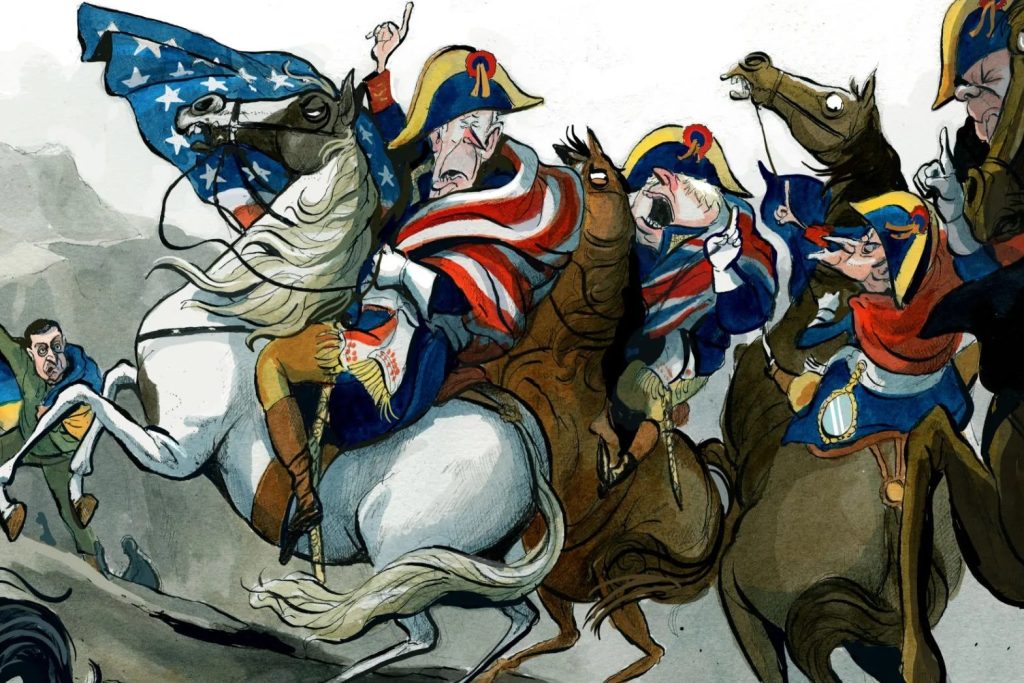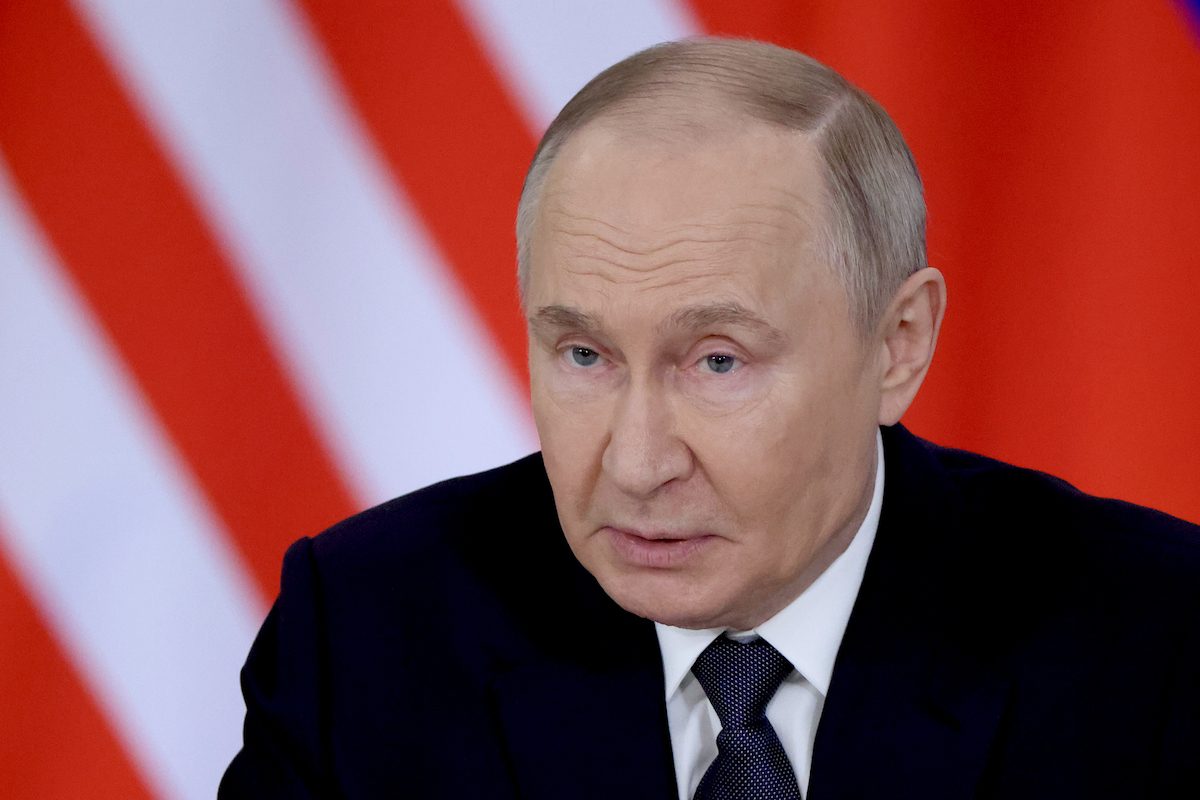As the second anniversary of Russia’s full-scale invasion of Ukraine approaches, the fall of the key eastern city of Avdiivka is one more sign that Vladimir Putin holds the initiative. Ukrainian troops resisted the Russian forces for months, but the threat of encirclement forced Ukraine’s new army chief, Oleksandr Syrskyi, to retreat. The Russians were firing 10,000 artillery shells a day; the Ukrainians had been able to reply with about 1,500. Such an imbalance made defeat inevitable.
There are risks in reading too much into a single military setback, especially in light of Russia’s extraordinary losses (more than 300,000 dead and wounded, elite special forces decimated, more than 2,000 tanks destroyed and twenty-four Russian warships sunk). But Putin is waging total warfare, using nuclear blackmail, terror and a vast increase in defense spending this year by turning Russia into a war economy. His military now absorbs 40 percent of Russian GDP.
Time and again, weapons which appeared off limits were later judged safe to deploy, six months too late
The fall of Avdiivka came with a fresh Russian nuclear threat. Dmitry Medvedev, a former Russian president and one of Putin’s closest allies, warned that Ukraine regaining its 1991 borders would mean the “collapse” of present Russia, whose constitution was recently amended to include captured territories. The Kremlin won’t let that happen, he said. A Ukrainian victory would trigger “a global war with western countries using the entire strategic arsenal of our state: on Kyiv, Berlin, London, Washington. All beautiful historical places, long ago included in the flight targets of our nuclear triad.”
Volodymyr Zelensky was abroad at the time, asking for more munitions to keep up the fight. Given the persistent failure of America and Europe to live up to their promises to Ukraine — the latest being desperately needed ammunition supplies — Zelensky wouldn’t be human if he didn’t fear a sell-out.
Criticism of Zelensky’s leadership misses the point. The West should be in the dock. Its whole approach to Russia’s invasion has been timid and reactive, compounded by strategic errors regarding Russian capabilities and intentions. Washington’s base assumption in the run-up to Putin’s invasion on February 24, 2022 was that Russian forces would overwhelm Kyiv in a week. The Biden administration was painfully slow to recalibrate. The subsequent debate over military aid has always been about how Putin would respond, rather than what Ukraine actually needed. “The West self-deterred,” I’m told by a US intelligence veteran.
Time and again, weapons which appeared off limits — tanks (Abrams and Leopards), long-range missiles and launchers (HIMARS and ATACMS) and fighter planes (F-16s) — were later judged safe to deploy, six months to a year too late. Some allies — Britain, Poland and the Baltic states and latterly France — have pushed the US to be bolder. Under Joe Biden and his process-obsessed aides, US policy has been determined by the slowest ship in the convoy (usually Germany, which is temperamentally pacifist).
Western governments also allowed expectations to run wild ahead of the Ukrainian counter-offensive last summer. Ukraine’s forces advanced without air cover from fighter planes or attack helicopters into the teeth of entrenched Russian forces with far more lives lost than would have been the case had the West provided the equipment needed. No British or American infantry force has exposed itself to that level of risk since 1945.
In hindsight, the West also fell victim to Russia’s nuclear blackmail. Such threats need to be taken seriously but Putin is no madman. He is a cynical KGB-trained spy, skilled in the art of destabilization. He was under heavy pressure from China not to press the nuclear button. If he had let off a tactical nuclear weapon, he risked a devastating military response from the US. Were these considerations given sufficient weight?
The final western mistake was to stiff Zelensky at last year’s NATO summit by adopting a wishy-washy commitment on future membership. This sent a signal of irresolution to Moscow. Yet the summit took place when Putin had suffered humiliation at the hands of the renegade warlord Yevgeny Prigozhin, whose mercenaries and ex-convicts had marched within 120 miles of Moscow.
At that moment of maximum vulnerability, Putin was exposed for what he is: a weak strongman. Any doubt on that score evaporated when he was filmed laughing and joking on the very same day that Alexei Navalny was declared dead in his prison north of the Arctic Circle. The fact that Putin felt it necessary to snuff out his last serious political opponent underlined his vulnerability.
Putin’s forces are now advancing again, with about 40,000 Russian troops near Kupiansk in the Kharkiv region preparing to attack. Some 20,000 Ukrainian troops are defending and we can expect the battle to play out as it did in Bakhmut and Avdiivka: to be decided by the depth of ammunition reserves. Sensing this, Denmark donated its remaining artillery store. If other countries were as generous, there would be fewer Russian victories.
Ukraine’s battlefield is a bloodbath. Russians are on the offensive along the entire front line, pushing back exhausted and desperate Ukrainian soldiers who are running out of weapons to fight with. The West needs to respond, fast. The $54 billion EU aid package was a start, but it will be delivered in increments over four years: short-term relief is needed. The stalled US contribution, held up by Trumpist Republicans in Congress, is a body blow to Ukraine morale and military capabilities. Both Europe and the US need to be far more ambitious in advanced weapons deliveries. The G7 should pursue the transfer of frozen Russian assets, as proposed by the former World Bank president Bob Zoellick.
Zoellick calls the move “elegant justice” — once again, he says, western governments are overstating the risks and failing to recognize the benefits. Apart from the much-needed psychological boost to Ukraine, it would force Putin himself to recalculate. For the past six months, it’s all been one-way traffic.
This article was originally published in The Spectator’s UK magazine. Subscribe to the World edition here.


























Leave a Reply